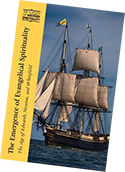Back to series


Recommended Reading:

Learning to Walk with Jesus
Click here to open a Print - Friendly PDF
|
In every age the followers of Jesus have been called disciples. Sometimes we in the contemporary church act as if we were the first serious believers of Jesus. In reality, we can learn a great deal from earlier Christians in how they sought to walk with Jesus. I have a particular interest in the early evangelicals of the eighteenth century; many of these key leaders have influenced us today. This article is based on my recent book, The Emergence of Evangelical Spirituality: The Age of Edwards, Newton, and Whitefield.1 True DisciplesTo contrast the sharp distinction between faithful followers of Jesus and those only in name, early evangelicals often spoke of “true disciples.” Some actually referred to what we might call nominal Christians as “pretenders.” Jonathan Edwards asserted,
George Whitefield, who crossed the Atlantic Ocean six-and-a-half times (he died and was buried in Newburyport, Massachusetts), declared,
Edwards cautioned his listeners that the world was not conducive to the gospel of Jesus Christ and that believers of Jesus must deny those earthly pleasures that hinder their growth in Christ. He declared,
Many eighteenth-century evangelicals stressed the critical nature of Luke 9:23, “Whoever wants to be my disciple must deny themselves and take up their cross daily and follow me,”5 and similar passages.
Fletcher realistically understood that many could be followers of Jesus in name only. After affirming the importance of Luke 14:26, “If anyone comes to me and does not hate father and mother, wife and children, brothers and sisters—yes, even their own life—such a person cannot be my disciple,” he proclaimed, “Christ evidently means, that whosoever does not love his Father, and his own life less than him, cannot be his sincere disciple.”8
While there are many benefits to walking with Jesus, early evangelicals also understood the cost of discipleship. Also writing in a letter, Whitefield reminded his friends of the lifelong practice of following Christ:
Clearly discipleship included hardships and struggles as one attempted to faithfully obey Jesus Christ. Whitefield reinforced this truth in a sermon on Luke 9:23, simply titled “Self Denial,” in which he announced:
To summarize, early evangelicals recognized that a disciple was a true believer of Jesus Christ. That person desired to walk in the way that Jesus called His followers to walk. Cultivating a Vital FaithfulnessDuring the early decades of the eighteenth century, church life lacked vibrancy, and cultural competition was often at odds with faithful discipleship. Not surprisingly the evangelical emphasis on new birth that is the expectation of readers of Knowing & Doing was a new message for many. How then did the early evangelicals seek to cultivate a vital faithfulness in following after Jesus? Noted evangelical scholar Mark Noll in his foreword to The Emergence of Evangelical Spirituality succinctly answers that question:
This narrative shape of the Christian life invites us to consider our own pilgrimage and maturity in Christ. New Life in Christ:13 Early evangelicals took sin seriously and understood its disastrous effects in splintering relationships with both God and humanity. The vivid language that described sin included worm of dust, lost, blind, wretched, pitiful, and starving. Evangelicals recognized that sin created doubt, fear, and numerous expressions of spiritual turmoil. Sin also could convince individuals that they could never escape this prison because they were unworthy. Fortunately these eighteenth-century believers were also cognizant of God’s grace and the promise of new life in Christ. Regardless of a person’s experience, God was rich in mercy and declared there was a better way of living. God’s outstretched arms of welcome were always extended with the invitation to come and be healed, restored, and forgiven. This was possible because Jesus Christ, the Lamb of God, shed His blood on the cross to save all those who would believe and follow Him (John 1:29). For early evangelicals, this was truly “amazing grace” that redeemed and created assurance of peace and comfort to troubled souls. The proper response to Jesus’ invitation was sincere repentance that exchanged one’s old life for a life that through self-denial sought to follow Jesus daily. The result of being spiritually awakened challenged all who practiced a formalistic or “Pharisee-like faith,” especially ministers who had not experienced the spiritual rebirth. Without the new birth no one could be a disciple of Jesus Christ! The Holy Spirit: |
|||
|
|
|||
|
Notes: |
|||

Tom Schwanda
Professor, Senior Fellow for Christian Spirituality, CSLITom Schwanda is associate professor of Christian Formation and Ministry emeritus at Wheaton College and adjunct associate professor of Christian Spirituality at Fuller Theological Seminary. Tom earned a Ph.D. from Durham University, a D.Min. from Fuller, and a M. Div. from New Brunswick Theological Seminary. He also studied at Gordon-Conwell Theological Seminary. He is the author of numerous articles and book chapters and three books, including The Emergence of Evangelical Spirituality: The Age of Edwards, Newton, and Whitefield and is currently preparing a book on George Whitefield, a biography that will highlight the importance of Puritans in his ministry.

Recommended Reading:
Tom Schwanda, The Emergence of Evangelical Spirituality: The Age of Edwards, Newton, and Whitefield, (The Classics of Western Spirituality) (Paulist Press, 2016)
The Emergence of Evangelical Spirituality offers readers a balanced collection of primary sources for eighteenth-century evangelical spirituality in America and Britain. Beginning with a chapter that introduces readers to the foundational nature and themes of evangelical spirituality, the book goes on to present the writings of men and women authors some very well known, others not well known grouped into six thematic categories. From giants of the movement such as Jonathan Edwards and George Whitefield to social reformers William Wilberforce and Hannah More and such hymn writers as William Cowper, The Emergence of Evangelical Spirituality presents an invaluable and unequalled treasury of authors representing a rich heritage of American and British spirituality for students and general readers alike.
 COPYRIGHT: This publication is published by C.S. Lewis Institute; 8001 Braddock Road, Suite 301; Springfield, VA 22151. Portions of the publication may be reproduced for noncommercial, local church or ministry use without prior permission. Electronic copies of the PDF files may be duplicated and transmitted via e-mail for personal and church use. Articles may not be modified without prior written permission of the Institute. For questions, contact the Institute: 703.914.5602 or email us.
COPYRIGHT: This publication is published by C.S. Lewis Institute; 8001 Braddock Road, Suite 301; Springfield, VA 22151. Portions of the publication may be reproduced for noncommercial, local church or ministry use without prior permission. Electronic copies of the PDF files may be duplicated and transmitted via e-mail for personal and church use. Articles may not be modified without prior written permission of the Institute. For questions, contact the Institute: 703.914.5602 or email us.
-
Recent Podcasts
A Welcome Change in Apologetics
by Randy Newman, Aimee Riegert on April 19, 2024We’re burdened for our friends who don’t know...Read More
-
Questions That Matter Podcast – Samuel James and Digital Liturgies
by Samuel James, Randy Newman on April 19, 2024
-
The Side B Stories – Dr. James Tour’s story
by Jana Harmon, James Tour on April 12, 2024
-
Recent Publications
Isn’t Morality Relative?
by Christopher L. Reese on April 1, 2024It is widely accepted in the Western world...Read More
-
Do Muslims and Christians Worship the Same God?
by Andy Bannister on March 1, 2024
-
Artificial Intelligence and Its Impacts on Humanity
by John Lennox on February 13, 2024
0
All Booked
0.00
All Booked
0.00
All Booked
22140
GLOBAL EVENT: Keeping the Faith From One Generation To Another with Stuart McAllister and Cameron McAllister, 8:00PM ET
https://www.cslewisinstitute.org/?event=global-event-keeping-the-faith-from-one-generation-to-another-with-stuart-mcallister-and-cameron-mcallister-800pm-et&event_date=2024-05-17®=1
https://www.paypal.com/cgi-bin/webscr
2024-05-17

Next coming event
Days
Hours
Minutes
Seconds
GLOBAL EVENT: Keeping the Faith From One Generation To Another with Stuart McAllister and Cameron McAllister, 8:00PM ET
On May 17, 2024 at 8:00 pmSpeakers

Tom Schwanda
Professor, Senior Fellow for Christian Spirituality, CSLI
Team Members

Tom Schwanda
Professor, Senior Fellow for Christian Spirituality, CSLITom Schwanda is associate professor of Christian Formation and Ministry emeritus at Wheaton College and adjunct associate professor of Christian Spirituality at Fuller Theological Seminary. Tom earned a Ph.D. from Durham University, a D.Min. from Fuller, and a M. Div. from New Brunswick Theological Seminary. He also studied at Gordon-Conwell Theological Seminary. He is the author of numerous articles and book chapters and three books, including The Emergence of Evangelical Spirituality: The Age of Edwards, Newton, and Whitefield and is currently preparing a book on George Whitefield, a biography that will highlight the importance of Puritans in his ministry.



 Francis Asbury, the leader of early Methodism in the American colonies and states, stressed this in his 1802 sermon: “The operations of grace upon believers, by which they live in self-denial of all evil; and bear the cross, enjoy the life of God, and exercise themselves in Christian temperance, justice, and holiness.”6 John Fletcher, John Wesley’s chief assistant in England, concluded his guidelines for self-examination—whether a person was a new creation in Christ—with these words:
Francis Asbury, the leader of early Methodism in the American colonies and states, stressed this in his 1802 sermon: “The operations of grace upon believers, by which they live in self-denial of all evil; and bear the cross, enjoy the life of God, and exercise themselves in Christian temperance, justice, and holiness.”6 John Fletcher, John Wesley’s chief assistant in England, concluded his guidelines for self-examination—whether a person was a new creation in Christ—with these words: In 1757 John Newton wrote a series of letters to a fellow minister. He began one epistle with an admonition to his friend and also himself: “I would earnestly press you and myself to be followers of those who have been followers of Christ; to aim at a life of self-denial; to renounce self-will, and to guard against self-wisdom.” Soon thereafter, Newton wrote again to this minister, expanding his explanation of a follower of Jesus:
In 1757 John Newton wrote a series of letters to a fellow minister. He began one epistle with an admonition to his friend and also himself: “I would earnestly press you and myself to be followers of those who have been followers of Christ; to aim at a life of self-denial; to renounce self-will, and to guard against self-wisdom.” Soon thereafter, Newton wrote again to this minister, expanding his explanation of a follower of Jesus:



